(The Attributes of Deliberate Practice: Focus and Concentration)
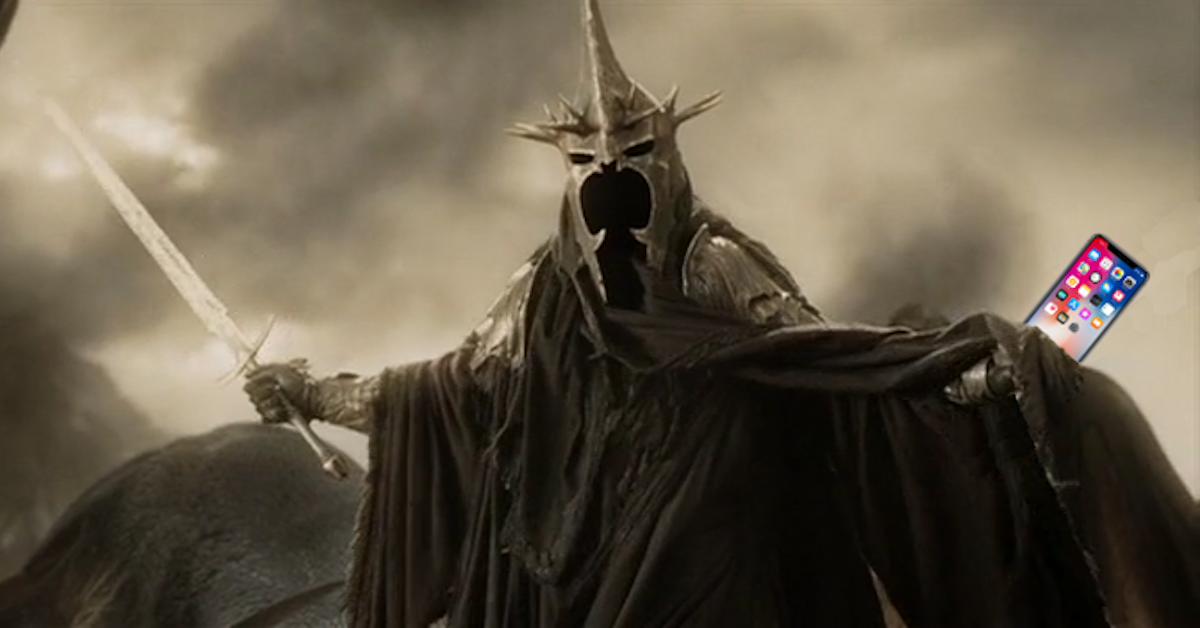
“They are…neither living or dead. At all times they [are] drawn to the power of the one…. They will bear thee away to the houses of lamentation, beyond all darkness, where thy flesh shall be devoured, and thy shriveled mind be left naked to the Lidless Eye.”

Oh — I’m sorry: did you think I was talking about J.R.R. Tolkien’s Lord of the Rings? I definitely could have been, since the enduring popularity of this franchise is a testament to its epic stories and lessons. I first read these books when I was 11 years old, and I’ve reread them countless times since. I was ecstatic when Peter Jackson released his trilogy from 2001-2003, reasonably entertained by The Hobbit follow ups (2012-2014), and thrilled that we’ll be getting some new streaming-stories via Amazon. (“Oh please let them be episodes of The Silmarillion….”)
But, no — I’m actually talking about a different recipe for enslavement, with a different Dark Lord. And the instrument of thralldom? Not nine rings, but rather this:
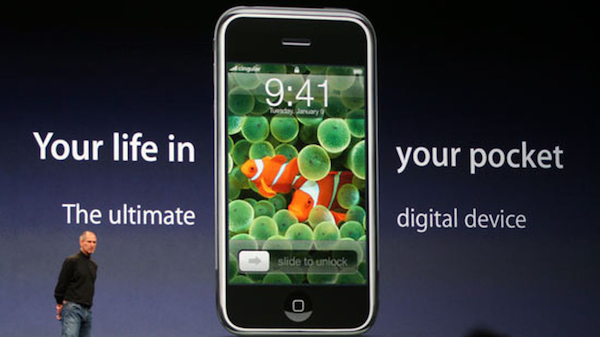
The smartphone.
And the ancient past? 2007: the year the smartphone was truly born.
Because the research is in: our phones are making us dumber. Not only that — they decimate our ability to focus and concentrate. This is deeply problematic for many things, but it is especially devastating for our working lives as musicians. Focus and concentration are indispensable attributes of deliberate practice, and they are also in short supply. Our phones are killing our practice. We are becoming slaves to our devices.
Focus and Concentration: A Deliberate “Fellowship”
Embarking on a career as a musician is a daunting task. It can be a harrowing and long journey. You’ll want a good map and a well-designed action plan. In order to avoid getting lost in the Mines of Moria, course corrections and feedback are extremely helpful. And to make sure you stay the course, two stalwart companions on your quest will be Focus and Concentration — the Fellowship of Deliberate Practice.
Unfortunately, many foes will seek to sunder this fellowship. In my various capacities as a teacher, guest clinician, audition coach, and private instructor, I have witnessed a near-universal trend among younger musicians: everyone gets distracted by their phone while they’re practicing. It’s an epidemic. I have yet to encounter any serious musician who has not struggled with this at some point since 2007.
Why is this such a problem? Because deliberate practice is mentally demanding in the extreme. (This is the deliberate part.) The second-by-second work of refining your craft requires full attention and conscious action. In part, focus and concentration are required because well-designed deliberate practice must be crafted for massive repetition, whereas we are not creatures naturally prone to doing something over and over and over again. We get bored. We prefer to move on. Massive repetition is mentally demanding because it goes against our nature. So if you’re not concentrating, you’re not really practicing. Mindlessly playing scales doesn’t count. Inattentive run-throughs don’t count. Concentration on your specific goals is required so that adjustments can be made via controlled practice. It’s adaptive. Immediately listening back to self-recorded takes, honestly assessing them, and re-listening multiple times with heightened perception is draining. As the hours roll by, this becomes absolutely exhausting. In fact, it’s so demanding that 3-5 hours is, on average, the upper limit of deliberate practice anyone can really do in one day. Deliberate focus is extremely taxing.
So it should be no surprise that our endeavor is imperiled by distraction. But we’re not just talking about Shire-garden-variety distraction: no, this foe has been forged by some of the sharpest engineers of our age, refined to be maximally addicting, and imbued with user interfaces tweaked to optimize dopamine hits. That’s more than a “problem” — that’s just plain dark.
A Darkness Rises in the East
In Tolkien’s epic, the threat of Sauron’s dark dominion is ever-present. The foulness of Mordor is barely kept at bay by the valiant Knights of Gondor, the only thing holding back the westward-sweeping evil. The free societies of Middle Earth are already on the verge of collapse; a technological superweapon would completely seal their fate.
What is this superweapon? The One Ring of Power:
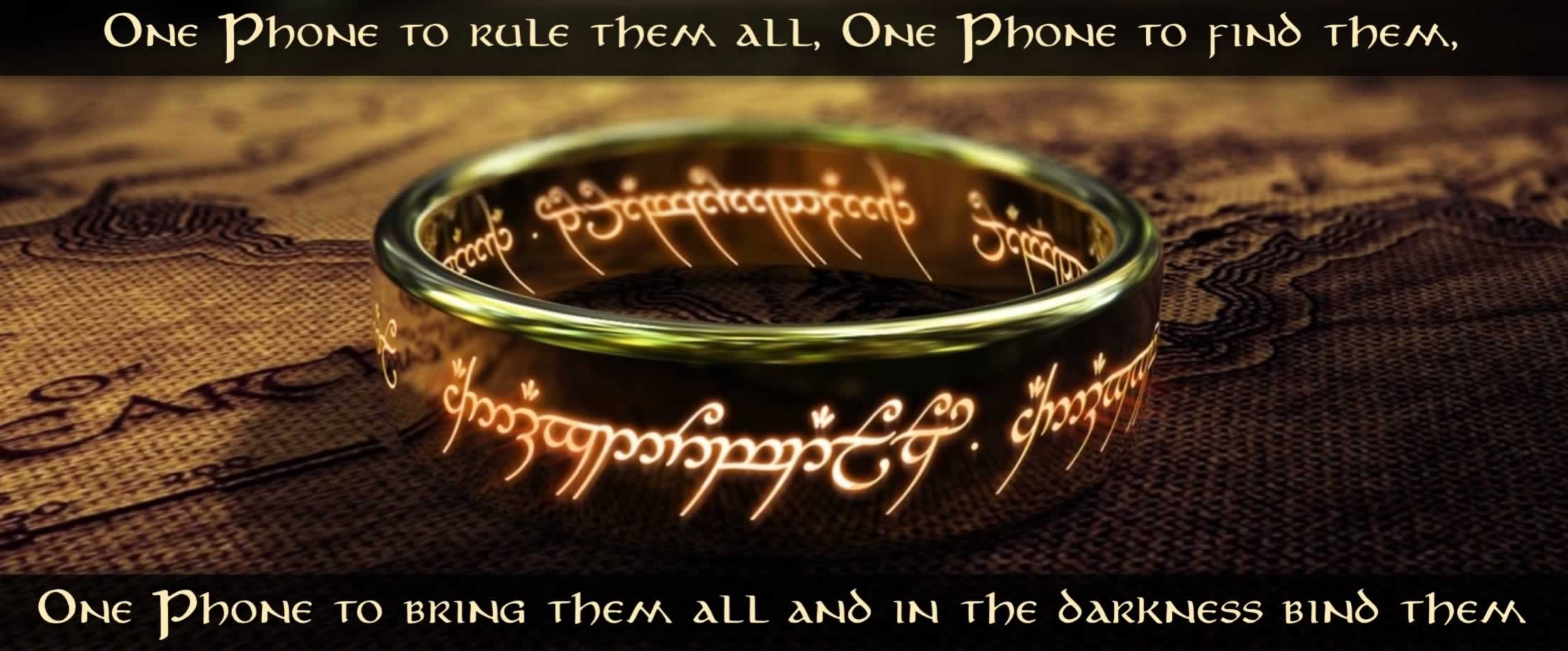
Now, to be absolutely clear: rings by themselves are not inherently evil. Celebrimbor was the elven smith who first enabled the rings of power. His elven rings were intended to be used constructively — basically elven efficiency tools.
But then along came Sauron the Deceiver, who tricked Celebrimbor into collaborating on ring-craft. In secret, Sauron forged the master ring to dominate all the others, and this technology led to war and conflict which would span the next 4960 years of Middle Earth’s history.
Hmm…technology proclaimed to be virtuous, only later revealed to possess some catastrophic downsides? Sound familiar? Back in our 21st century Regular-Earth, we have our own version of Celebrimbor. (For the sake of argument, let’s call him “Stark Zuckerjobs.”) Stark Zuckerjobs has made a lot of great stuff. We can digitally connect with virtually every other human on the planet using a handheld device that lives in our pocket and houses all human knowledge. Nothing to sneeze at. But like Celebrimbor, Zuckerjobs’ cleverness and pride blinded him to the risks of his creation. In both worlds, these technologies arose out of well-intentioned hubris. And in both worlds, the “enemy in the east” co-opted the technology to imperil the civilizations of the west.
Bummer.
Now, while we’re not yet marching off to fight Putin before the Black Gate of Udûn, smartphones have already begun to reveal startling and deleterious impacts on our lives. Smartphones reduce our brainpower and hijack our minds. They damage our relationships to the point that we’ve had to invent a new word (“phubbing”). They reduce us to canine levels of obedience as we respond to dings and pings with Pavlovian predictability. We are subjugated. We are enslaved.
Who’s the Tool Here?! (Double-Edged Digital Swords)

Smartphones are powerful tools. But they are also double-edged swords. Like all technology, they can be leveraged for good or manipulated for evil.
I have always been a big advocate of incorporating technology and efficiency tools to amplify the impact of my practice. HUGE YES. As in many other areas, certain technological advancements have enabled us to get much better much faster than our forebears. To wit:
“Those who used the Nine Rings became mighty in their day, kings, sorcerers, and warriors of old. They obtained glory and great wealth…” (The Silmarillion)
The upside is great. But we must be constantly wary of the threats posed by our own technologies.
Focus and concentration are clear victims in this regard. Granted, it’s been a long time since the workday standard of Mahler’s idyllic distraction-less composing hut in the woods. But since the mid 1990s, western civilization has been rapidly accelerating in the opposite direction. We are besieged by all manner of devices constantly vying for our attention and distracting us from focused work. (There are days when it takes me an hour to send a three-sentence email, simply because I’m getting distracted by something else every 30 seconds.) Achieving true focus means swimming upstream against received behavior and the commercial pressures of modernity.
So we must be constantly on guard against technology’s downsides. But speaking as a scientist, I will be the first to admit that scientists and engineers have a terrible track record in this regard. The development of nuclear weapons is probably the most obvious example so far, but lesser examples abound. (To say nothing of climate change induced by CO2 emissions.) We tend to leap before we look. The collective question is never: “We can do this, but should we do this?” Instead, the question is: “Since it’s inevitable that someone will do this, how can we do it first?” Consequences-be-damned, we’ll just deal with the collateral damage later.
That works just fine. Until it doesn’t:
“They obtained glory and great wealth…yet it turned to their undoing…. One by one, sooner or later, according to their native strength and to the good or evil of their wills in the beginning, they fell under the thralldom of the ring that they bore…and they became forever invisible…and they entered into the realm of shadows. The Nazgûl were they….” (The Silmarillion) [Ironically, our phones possess the power to make everyone else around us become invisible.]
Tolkien served in the British Expeditionary Force during World War I, and spent four months in the Battle of the Somme in 1916. The horror of technological warfare is a constant theme throughout his writing. Considering that the three books comprising The Lord of the Rings were not published until 1954-55, the Rings of Power can be seen as powerful metaphors for nuclear annihilation. But I believe that Tolkien intended this metaphor more broadly as an evergreen reminder of the double-edged sword of our technological achievements. We cannot stop those advances, but it is imperative for us to vigilantly guard against their negative consequences.
At this point you might be thinking, “dude, you are making an awfully big deal out of my phone!”
Am I? First of all, I’m pretty sure you’re reading this on your phone right now. After all, thanks to the power of google analytics, I know that precisely 70.6% of you will view this article on a mobile device. You might be on the bus. Or maybe the subway. Perhaps you’re waiting in line. Or stuck at a long red light and admonishing yourself for reading your phone while driving. Whatever it is, look around you: what is everyone else doing? And how many of them are on their phones?
Make no mistake: smartphones are changing the way we live, and not all for the better. You might think that your phone gives you great power, or great entertainment; actually, it is enslaving you.
“Nah,” you protest. “That’s not happening to me. I have a healthy relationship with my phone!”
You know who else thought they had a healthy relationship with their coveted technology? Isildur. And he ended up at the bottom of the Anduin River with a bunch of arrows in his back.
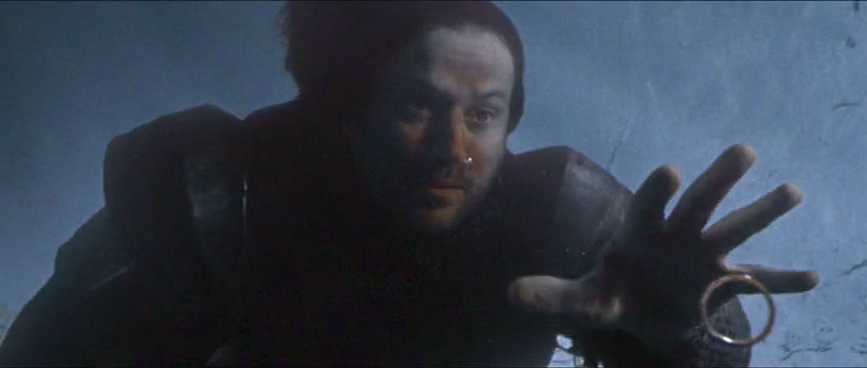
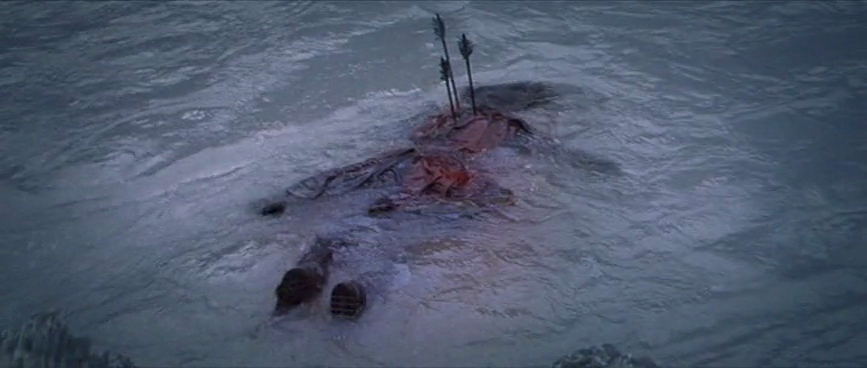
A Light in Dark Places
This all might seem fairly bleak so far, but there is hope — a way we can begin pushing back the enslaving darkness.
Now, in Middle Earth, all they had to do was toss the One Ring in a volcano. Problem solved!
Unfortunately, our 2018 smartphone-dependence doesn’t seem to have a similarly robust solution available…so if we can’t eradicate smartphones, we’d at least better figure out how to manage them more effectively.
For as Galadriel says to Frodo, “The light of Eärendil’s star…will shine still brighter when night is about you. May it be a light to you in dark places, when all other lights go out.” We too have a way forward, guided by the light: AIRPLANE MODE.
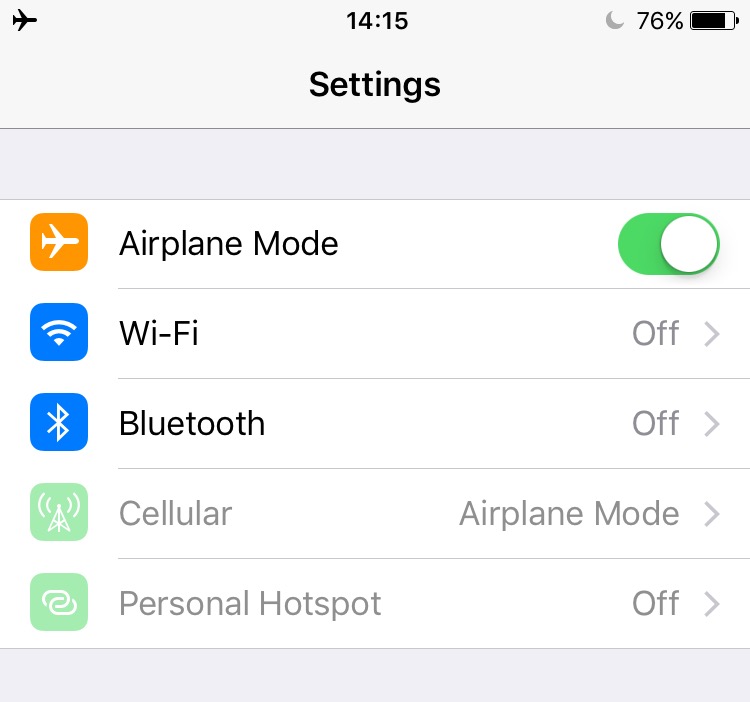
I use airplane mode all of the time. To the point where friends and colleagues get frustrated by my unavailability. “You know what?” I think to myself, “that’s okay. It can wait. Because I need to focus.” Airplane mode is like a halo of light amidst the darkness of distraction.

Airplane mode is the first step out of the darkness of smartphone servitude. And it’s a powerful step. Anytime you are in the practice room, your phone goes into airplane mode. Period.
But airplane mode might still be insufficient. Because recent research suggests that airplane mode isn’t enough — just the mere presence of your phone is distracting:
“In two lab experiments, nearly 800 people completed tasks designed to measure their cognitive capacity…. Before completing these tasks, we asked participants to either place their phones in front of them (face-down on their desks), keep them in their pockets or bags, or leave them in another room. The results were striking: individuals who completed these tasks while their phones were in another room performed the best, followed by those who left their phones in their pockets. In last place were those whose phones were on their desks.”
Yikes.
“But I use my phone to practice! It’s got a great metronome app, and an excellent tuner!”
My advice? By this point, we all have multiple old phones. Take one of them and wipe it of absolutely everything except practicing apps, rendering it dead to the outside world. Let that be the only device you allow into the practice room. Let that be the way you avoid practicing like a Nazgûl.
Hopefully, sticking to these guidelines can begin to dial back your smartphone dependence, at least while you’re in the practice room. If you can wean yourself off of those dinging notifications and that brightly lit screen, your practicing will become radically more efficient.
And if not, well…you can always enlist a hairless ancient stoor to bite off your swiping finger!
![]()

